Guide to Buying
Dominican Republic Real Estate
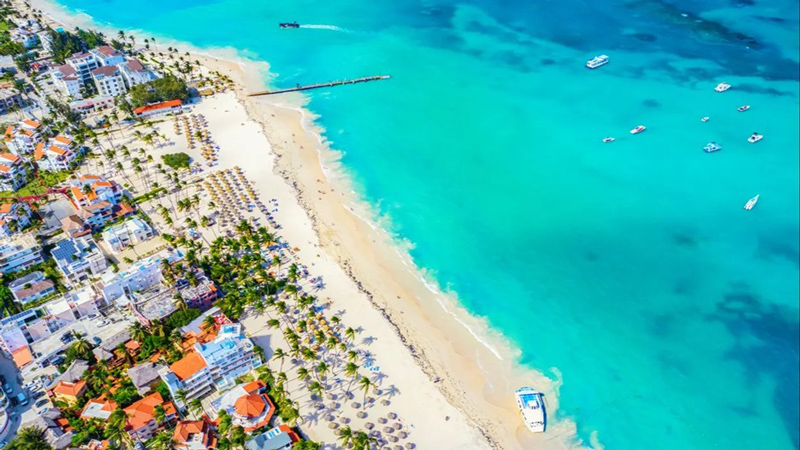
The Dominican Republic is one of the most accessible and affordable Caribbean destinations for property buyers. With palm-lined beaches, a warm tropical climate, and a growing tourism sector, it offers a lifestyle many dream about, at a fraction of the price you’d pay in more developed Caribbean markets.
The country has seen a significant increase in visitors in recent years, reaching a record 11 million tourists in 2024. That boom is creating strong interest in real estate from both lifestyle buyers and investors.
Foreigners have the same rights as locals when it comes to buying property. You can own anything from a condo to a beachfront villa or a piece of land. Importantly, there are no restrictions on ownership, and you can secure full legal title through the local property registry system.
Whether you’re looking for a vacation home, a rental property, or a long-term residence, the Dominican Republic offers real value. The buying process is relatively straightforward, but there are some local rules and procedures you need to understand.
From choosing the right location to understanding legal requirements, and closing costs, this guide will walk you through everything you need to know about buying real estate in the Dominican Republic.
- Guide to Buying Dominican Republic Real Estate
- Reviewed by Ronan McMahon
- Why Invest in Real Estate in the Dominican Republic
- Where to Buy Property in the Dominican Republic
- Can a Foreigner Buy Property the Dominican Republic
- The Buying Process in the Dominican Republic
- Costs & Fees On Real Estate in the Dominican Republic
- Financing Property Purchases in the Dominican Republic
- Buying Real Estate in the Dominican Republic: Our Thoughts
- Sign up to Overseas Dream Home now, and Discover The Best Places in the World to Buy Real Estate 2025.
- Sign up to Overseas Dream Home now, and Discover The Best Places in the World to Buy Real Estate 2025.

Reviewed by Ronan McMahon
Ronan McMahon is an Amazon best-selling author and expert in international real estate. He regularly contributes to Overseas Dream Home. Visit his website at ronanmcmahon.com
Why Invest in Real Estate in the Dominican Republic

It’s not all beautiful beaches. The Dominican Republic has a UNESCO World Heritage historic centro in the capital, Santo Domingo.
The Dominican Republic has positioned itself as one of the top real estate investment destinations in the Caribbean. Strong tourism, consistent infrastructure development, and a welcoming investment environment make it an attractive option for both lifestyle buyers and those seeking rental income or capital growth.
Tourism is a major driver of the real estate market. After Mexico’s Riviera Maya, the Dominican Republic gets the most tourists in the entire region.
And just like Mexico’s Riviera Maya, the Dominican Republic has seen a huge surge of visitors post-pandemic, thanks in no small part to its easy access from the U.S.
In 2024, the country welcomed a record 11 million visitors, including 8 million tourists and over 2 million cruise passengers.
This continued growth fuels demand for short-term rental properties, particularly in established tourist hubs like Punta Cana, Las Terrenas, and Sosúa. As occupancy rates rise and nightly rates remain competitive, property owners benefit from income streams in the vacation rental market.
The government supports real estate development through tax incentives and infrastructure investment. Roads, airports, and utilities continue to improve, especially in regions with growing expat and tourist communities. These upgrades help stabilize property values and make lesser-known markets more accessible.
Foreign buyers face no ownership restrictions, and the legal framework allows for full title registration and property rights. This level of security is not always available in other Caribbean countries, making the Dominican Republic more appealing to international investors.
Another advantage is the relatively low cost of real estate. Compared to the U.S., Europe, and other Caribbean islands, property prices in the Dominican Republic remain affordable, while offering similar rental potential. Buyers can often enter the market with a starting budget of under US$150,000, especially in up-and-coming areas.
Lastly, the country’s strong ties with North America, including daily direct flights and a large Dominican-American population, support both investment and lifestyle demand. Many buyers choose to use their property part-time and rent it out for the rest of the year, generating income while enjoying the benefits of ownership.
Where to Buy Property in the Dominican Republic
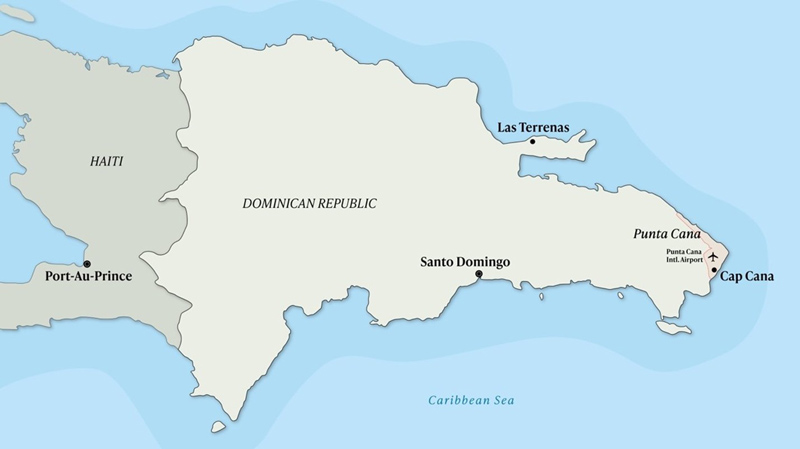
There’s a variety of locations around the Dominican Republic to suit every taste and budget.
The Dominican Republic offers a variety of locations for property buyers, each with its own appeal depending on lifestyle, budget, and purpose. Whether you’re seeking a beachfront condo, a villa with rental potential, or a quiet spot for retirement, there are several popular areas to consider.
Punta Cana
Punta Cana is the most established market in the country, attracting over 40%of all tourists. This region has seen significant real estate development, with gated communities, resort-style condos, and beachfront homes in high demand.
The area benefits from excellent infrastructure, including an international airport, private hospitals, and modern shopping centers. Its popularity with short-term vacationers also makes it one of the top spots for rental income.

Punta Cana is the Dominican Republic’s most-visited destination.
Cap Cana
Cap Cana is a luxurious resort and real estate community located on the eastern tip of the Dominican Republic, adjacent to Punta Cana. It is a stunning 30,000-acre (twice the size of Manhattan) master-planned community featuring pristine white sand beaches, turquoise waters, and lush tropical landscapes.
This is a veritable city state devoted to high-end luxury. It has over three miles of white-sand beaches and miles more of coastline. You have schools, world-class golf, a huge inland marina, a university campus, fitness centers, convention centers, one of the Caribbean’s finest equestrian facilities…a fire station, a clinic…and the Caribbean’s largest water park, its amphitheater inaugurated by Elton John.
Everything in Cap Cana screams luxury.
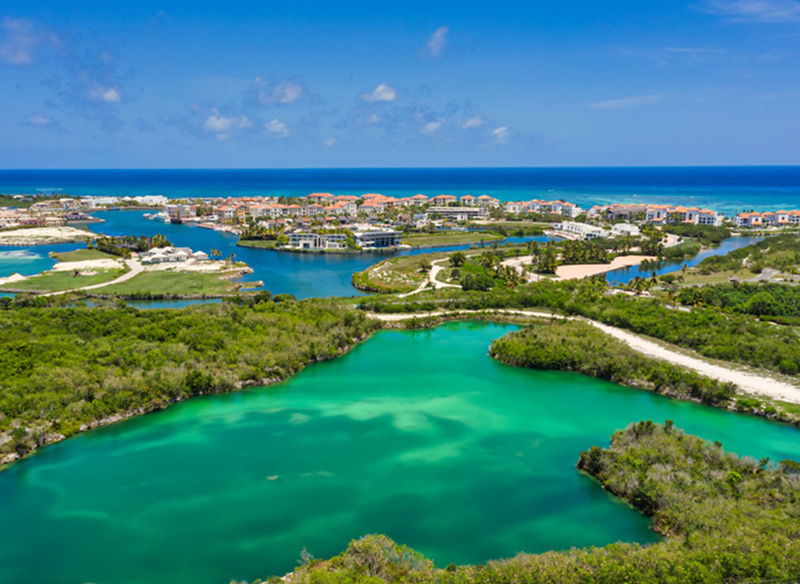
Cap Cana is the pinnacle of luxury living in the Dominican Republic.
It’s home to a St. Regis. You’ll find Hyatt…Secrets…and a stunning Eden Roc. It also has…Top-tier golf courses, more than 30 upmarket dining establishments, including fine dining, steak houses, beach clubs, chic cocktail bars, Spanish and Italian restaurants, sushi and other Japanese cuisine, charming cafes, ice cream parlors and candy shops, and much, much more…An adventure park, complete with animal encounters, ziplines, off-road trails for ATVs, and more. The stables offer horseback riding…and An expansive, pristine marina with 150 slips. It can accommodate yachts of up to 150 feet.
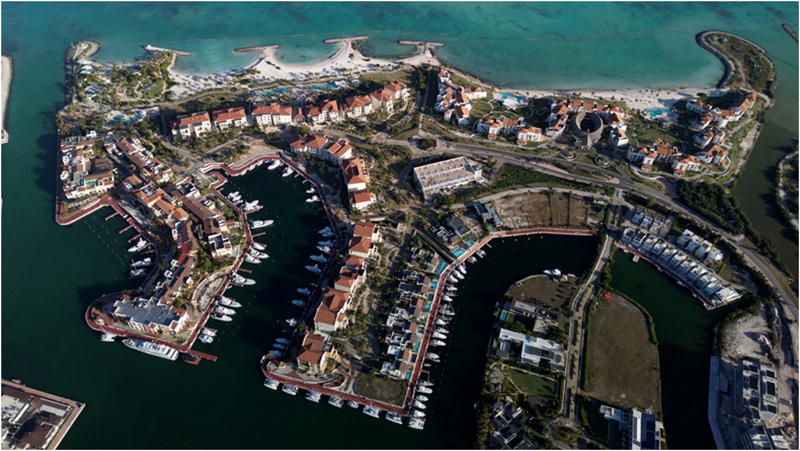
Cap Cana has a world-class full-service marina.
There’s also a tennis club, spa and wellness offerings, a hospital and bilingual school. There’s even a polo ground and facilities for dressage. And it’s all set against a backdrop of stunning beach…azure Caribbean waters, an expanse of sugar-white sand, all fringed by swaying palm trees.
With its commitment to preserving the natural environment and providing exceptional services, Cap Cana attracts visitors and investors seeking a lavish Caribbean lifestyle. And Cap Cana’s proximity to the Punta Cana International Airport, just 20 minutes, makes it easily accessible for travelers from around the world.
Las Terrenas
Las Terrenas, located on the Samaná Peninsula, is known for its scenic beaches and blend of Dominican and European influences. It’s particularly popular with buyers looking for a relaxed lifestyle in a walkable town. While development here is more boutique, the area has a well-established expat community and continues to grow in popularity.
Cabarete and Sosúa
Cabarete and Sosúa, on the north coast, appeal to younger buyers and digital nomads. These beach towns offer a vibrant social scene, with water sports, cafes, and co-working spaces. Property prices remain relatively affordable, making them attractive for first-time international buyers and those looking to generate rental income.
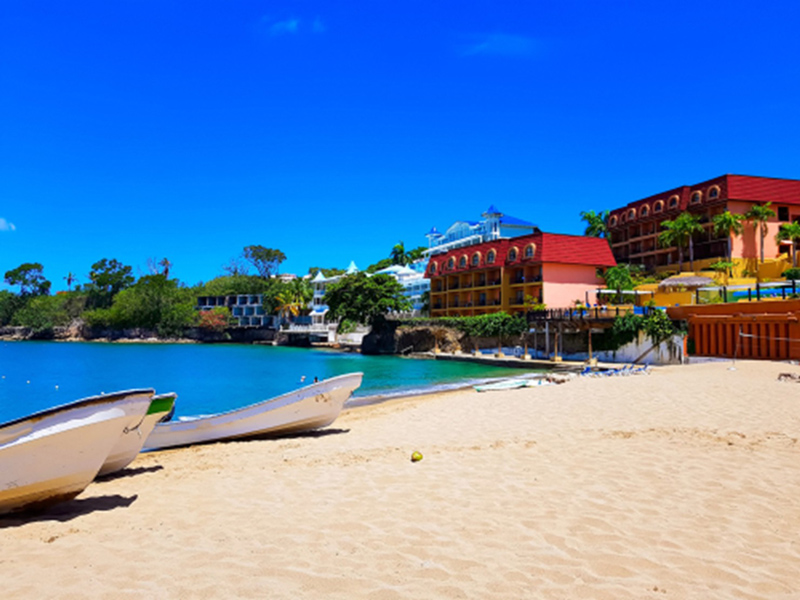
The north coast of the Dominican Republic, home to the town of Sosúa, is one of the country’s up-and-coming locations.
Jarabacoa and Constanza
Inland, Jarabacoa and Constanza offer a completely different lifestyle. Located in the country’s mountainous center, these towns have a cooler climate and are popular for eco-tourism and weekend homes. Real estate in these areas tends to be more rustic and appealing to buyers seeking a natural retreat rather than a beach destination.
Each of these areas offers something different in terms of lifestyle and investment potential. The key is to consider what you want from the property… whether it’s rental income, capital growth, or simply a place to relax. Visiting several regions before buying is a good idea to get a feel for what suits you best.

Sign up to Overseas Dream Home now, and Discover The Best Places in the World to Buy Real Estate 2025.
Enter your email now to download The Best Places in the World to Buy Real Estate in 2025.
You’ll also start receiving your free Overseas Dream Home eletter in your inbox every day!
No-spam pledge: We value your privacy. You can unsubscribe at any time.
Can a Foreigner Buy Property the Dominican Republic
Yes, it is perfectly legal for foreigners to buy and own property in the Dominican Republic.
In fact, unlike other parts of the Caribbean, there are no restrictions on foreigners buying real estate in the Dominican Republic.
Foreigners and expats can enjoy the same rights as Dominican nationals when it comes to buying real estate. And, as a foreigner, you can buy anything from beachfront villas to apartments, to plots of land.
However, while it is completely legal for foreigners and expats to buy property here; there are some country-specific guidelines that you should be aware of before purchasing Dominican Republic real estate.
Understanding the local climate and lifestyle preferences will help you find the perfect location for your new home or investment in Portugal.
The Buying Process in the Dominican Republic

Foreigners can legally buy property in the Dominican Republic.
Buying property in the Dominican Republic is relatively straightforward for foreigners, but it’s important to understand the local procedures. There are no restrictions on foreign ownership, and you can purchase freehold title to land and property. However, working with professionals who understand the local system is essential for a smooth transaction.
In the Dominican Republic, it’s typical for most purchases to begin with a verbal agreement between buyer and seller. When an agreement is reached, a formal offer is made in writing.
Once the written offer is accepted, the buyer is usually asked for a “good faith” deposit of a few thousand dollars while the buyer does his due diligence. This is normally refundable if the buyer backs out during the due diligence timeframe, which needs to be agreed with the seller before making the deposit.
This is then followed by a formal Promise of Sale contract.
At this point, you will want to carry out your due diligence, conducted by a local attorney. This step is important for verifying the property’s legal status, ensuring there are no debts or liens, confirming title ownership, and checking zoning compliance.
The attorney will also confirm that the property has a Certificate of Title, issued by the Title Registry Office. Your contract must explicitly state that the seller is legally obligated to execute the Deed of Sale and transfer the title upon receipt of the final payment and the completion of the transaction.
The Promise of Sale document is a binding legal document that outlines the terms of the sale, including the agreed price, payment schedule, and penalties for non-compliance.
It is typically signed in front of a notary (this can be done electronically or if your lawyer has power of attorney they can sign on your behalf if you’re not in-country) and will include:
- The full names and passport information of all parties involved in the transaction, including their spouses, if applicable.
- A detailed and accurate legal description of the property being purchased.
- A detailed list of the fixtures, fittings, and/or appliances that will be included in the sale.
- The agreed-upon purchase price and the specific terms of payment.
- The contract should include a default clause that outlines the consequences and remedies in the event of a breach of contract by either party.
- The exact date on which the property will be physically (the keys) and legally (the title deed transferred) delivered to the buyer.
Once the property clears due diligence, the final Contract of Sale is signed. This is when the buyer transfers the remaining funds, and the property is officially registered in their name. The transfer process can take a few weeks, depending on the location and efficiency of the local registry.
There is no requirement for buyers to be physically present in the country during the purchase. Many buyers complete the process using a power of attorney, especially if working with a local real estate agency or attorney. This is useful for managing paperwork and bank transfers if you’re based abroad.
Costs & Fees On Real Estate in the Dominican Republic
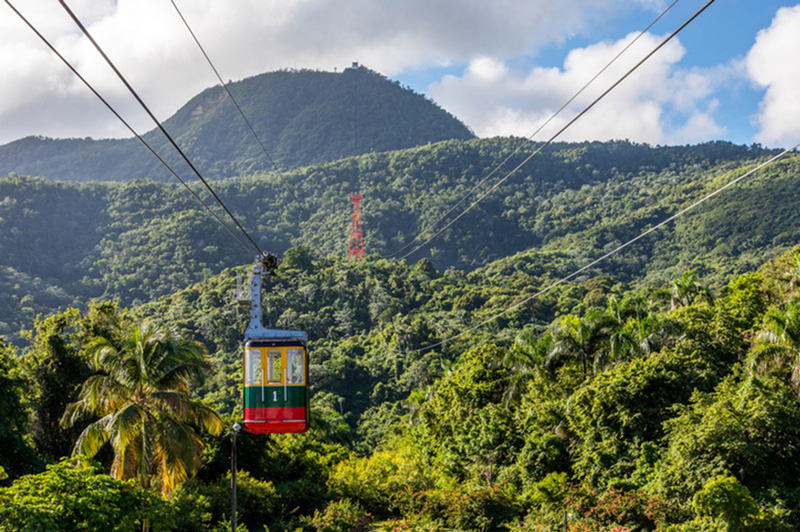
Although the Dominican Republic is famous for its beaches, it also has a stunningly beautiful and verdant interior.
Buying property in the Dominican Republic comes with several transaction-related costs. These are generally lower than in many other countries, but it’s important to understand the breakdown to budget properly and avoid surprises.
Closing Costs On Real Estate in the Dominican Republic
In the Dominican Republic, closing costs are typically paid by the buyer, apart from the real estate agent’s fee, which the seller pays. Closing costs typically run up to 5%. They will be lower if the property has the Confotur approval/exemption.
Confotur, also known as Tourism Incentive Law No. 158-01, is a specific program set up by the Dominican government to promote investment in tourism development. Some (but not all) newer real estate projects in tourist areas, such as Punta Cana and Las Terrenas, have Confotur approval. Confotur tax benefits include an exemption for the 3% transfer tax, which is detailed below.
Transfer Tax on Properties in the Dominican Republic
The primary cost is the transfer tax, which is currently 3% of the property value. The amount is based on either the purchase price stated in the promise of sale contract or 70% of the property’s market value as assessed by tax authorities, whichever is greater. So, if your contract price is lower than the tax authority’s assessed market value, they’ll charge you transfer taxes against that higher appraised amount.
Property Tax in the Dominican Republic
Annual property taxes, known as Impuesto Patrimonio Inmobiliario (IPI), apply to properties valued over and above RD$10,190,833 (roughly US$171,575) and are calculated at 1% of the value above that threshold.
Legal Fees on Real Estate Transactions in the Dominican Republic
Legal fees are another standard cost. These usually range from 1 to 1.5% of the purchase price, depending on the complexity of the transaction and the attorney’s fee structure. These fees cover the due diligence process, contract drafting, and property registration.
In addition, notaries and other administrative costs may add another 0.2 to 0.5% to the overall transaction.
Tax Exemptions
Property owners who have purchased a Confotur-certified property have an up to 15-year tax exemption, including transfer tax, annual property tax, and income tax on the annual 20% tax on rental income.
Capital Gains Tax
When you sell a property in the Dominican Republic, you must pay a 25%-27% capital gains tax (Impuesto Sobre la Renta) on any profit you make. This is based on the difference between the amount you paid for the property and the amount you sold it for.
Tax on Income from Your Property
If you’re making money by renting out your property in the Dominican Republic, you’ll have to pay an additional tax. This tax is a flat 27% of your rental income after subtracting allowed expenses like maintenance and utility costs.
Financing Property Purchases in the Dominican Republic
Foreigners can obtain loans in the Dominican Republic and this includes mortgages to purchase real estate. Foreigners are allowed to purchase property outright without needing residency status, but to secure a mortgage it definitely helps to be a legal resident with a visa.
The process is also easier if you have established ties and a credit history in the country.
Non-residents can receive financing between 50% and 70% loan-to-value, while residents are offered up to 80% loan-to-value.
This is what banks typically look for in your application:
- Steady income and solid credit history (this can be from abroad) that shows you can repay the loan.
- Proof of income, including pay stubs, tax returns, and bank statements.
- A debt-to-income ratio (including the mortgage) of under 30% to 40%.
- A down payment of 20% to 30%.
Buying Real Estate in the Dominican Republic:
Our Thoughts

Although most expats in the Dominican Republic live at the beach, they avail of the shopping and other services, in the larger towns and cities sprinkled around the country.
Buying real estate in the Dominican Republic offers an appealing mix of value, lifestyle, and investment opportunity. With no restrictions on foreign ownership, a transparent title system, and a growing tourism economy, it’s one of the most accessible markets in the Caribbean.
From the well-established appeal of Punta Cana to emerging hotspots like Las Terrenas and Cabarete, buyers have a range of locations to choose from based on their goals.
While the buying process is relatively straightforward, it’s important to work with experienced local professionals, especially for legal checks and registration. Costs and fees remain low compared to other international destinations, and there are both cash and seller-financed options available.

Sign up to Overseas Dream Home now, and Discover The Best Places in the World to Buy Real Estate 2025.
Enter your email now to download The Best Places in the World to Buy Real Estate in 2025.
You’ll also start receiving your free Overseas Dream Home eletter in your inbox every day!
No-spam pledge: We value your privacy. You can unsubscribe at any time.